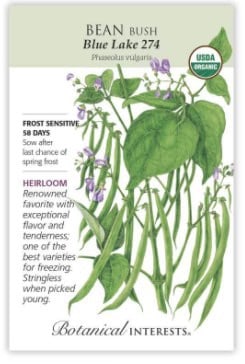Taking It Way Back with Heirloom Seeds
It’s no secret that we live in a society that says bigger is better, quantity over quality, and dress to impress. Remember the way your grandparents used to talk about their life? Things moved a lot slower. They took the time to appreciate and enjoy what they had. And, just about everything was home-cooked with love from real, fresh ingredients. Ah, those were the days. In an age of technology, we may not be able to make things slow down — efficiency is time and time is money. However, we can take it way back to good, nutritious food with heirloom seeds.
 Much like the sentimental items your ancestors pass down from generation to generation, heirloom seeds follow the same principle. Heirloom seeds are plant seeds that have been planted and the subsequent seeds produced from the harvest are saved year after year after year. In order to make the cut, most horticulture gurus, such as those at Botanical Interests, will consider open-pollinated varieties over 50 years old to be heirloom. Interestingly, many heirloom seeds have been around for far longer. So, why make the switch to heirloom seeds? Let’s go over all the great benefits of kicking it old-school in the garden.
Much like the sentimental items your ancestors pass down from generation to generation, heirloom seeds follow the same principle. Heirloom seeds are plant seeds that have been planted and the subsequent seeds produced from the harvest are saved year after year after year. In order to make the cut, most horticulture gurus, such as those at Botanical Interests, will consider open-pollinated varieties over 50 years old to be heirloom. Interestingly, many heirloom seeds have been around for far longer. So, why make the switch to heirloom seeds? Let’s go over all the great benefits of kicking it old-school in the garden.
3 Reasons to Choose Heirloom Seeds
- Firstly, these good ol’ seeds are the bee’s knees. No, really. The plants are all naturally pollinated in the open air, whether by bees, birds, or wind. Since they are naturally pollinated, they are never artificially crossed with any other plants to create hybrids – not in the field, not in a lab. For example, with hybrid seeds, the drought resistance of one plant might be crossed with the flavor of
 another. Hybrid plants can never be considered heirlooms because they are modified (not to be confused with genetically modified) and not 100% reproducible from those seeds year over year. In other words, if you planted the seeds from last year’s hybrid tomatoes, this year you might get a drought-resistant plant OR a tasty one. Heirlooms are holistically cultivated. Additionally, the life of an heirloom plant includes tender loving care, and plants are never chemically treated. This further maintains the seed integrity.
another. Hybrid plants can never be considered heirlooms because they are modified (not to be confused with genetically modified) and not 100% reproducible from those seeds year over year. In other words, if you planted the seeds from last year’s hybrid tomatoes, this year you might get a drought-resistant plant OR a tasty one. Heirlooms are holistically cultivated. Additionally, the life of an heirloom plant includes tender loving care, and plants are never chemically treated. This further maintains the seed integrity. - Secondly, because of the consistency and lack of tampering, the edible plants produced from these seeds are full of flavor. What’s more, they are often higher in nutrients because remember, we’re going for quality over quantity here. The yield may not be huge in year one, but the benefits are bountiful! In conventional growing, it’s all about forcing yields. This tends to deplete the soil of nutrients, and thus, your food, and wellness suffers.
- Lastly, heirloom seeds are the gift that keeps giving. Due to their uncompromised nature, seeds can continually be saved for use over and over. That’s right, given time, there’s no need to buy seeds. Additionally, over time, the seeds will adapt to the conditions they are being grown in. Thus, with each passing year, the harvest will get better and better as they get to know your mini-habitat.
Organic and Heirloom
Much like that beloved piece of jewelry, family portrait, or stuffed animal passed down through generations, seeds are the same. Someone way-back-when spent a lot of time, energy, and care to cultivate something wonderful. And their foresight, vision and integrity motivated them to save them for the people they care about and possibly the human race. Not to mention, it’s just plain cool! Knowing that something from so long ago continues to create sustenance for us today is just downright amazing. Certified USDA Organic heirloom seeds, from Botanical Interests, inspire culinary magic year after year. Heirloom flower seeds bring joy, too.
Botanical Interests USDA Organic heirloom seeds are available for sale in-store. Sustainable agriculture starts in your backyard.
This will keep you out of trouble while you watch your garden grow.
https://www.martindalesnutrition.com/product/compost-tea-bags-plant-food/
